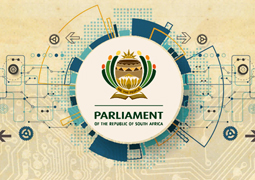
Parliament is hosting an exhibition to showcase South Africa’s readiness for the fourth industrial revolution (FIR). The Department of Science and Technology (DST) and its entities, including the Council for Scientific and Industrial Research (CSIR) are among the exhibitors showcasing research and development at the exhibition.
Speaking during a walkabout of the exhibition today with the Speaker of the National Assembly, Ms Baleka Mbete, the Deputy Speaker of the National Assembly Mr Lechesa Tsenoli said Parliament is at a strategic place to keep an eye on developments and to assess them.
“Any developments that occur we must assess them for our society as a whole. We have a huge level of poverty, inequality and unemployment and therefore we need to understand what is the impact of these developments,” said Mr Tsenoli.
Parliament must understand the risks of these developments, including security risks, so that these can be addressed. “The reason we invited these people (exhibitors) here is that we want to raise public awareness, not only among Members of Parliament, but also for parliamentary officials, other institutions and school kids,” he said.
Children attending the exhibition have been excited to watch movies about the FIR. “Some of them are going to leave here having changed their minds on what they want to do in their education. These things that children are exposed to have an impact on their education; they develop appropriate skills. The old content disappears. So whatever you have learnt you need to upgrade it.”
“As Parliament and government, we oversee the innovative institutions. We hope that we can raise enough money to provide support and funds for these innovative interventions” said Mr Tsenoli.
The theme of the exhibition is – The fourth industrial revolution: demonstrating South Africa’s readiness, and it will run from 12 to 14 February, culminating in a roundtable discussion on 15 February. The exhibition is supported by government departments and industry, and features exhibitions of projects such as the wheat breeding project based at the University of Stellenbosch, as well as others on 3D printing, robotics, artificial intelligence and big data.
South Africa’s response to the FIR is informed by the country’s socio-economic imperatives. Parliament has noted that the national system of innovation (NSI) has been active in developing a range of technologies designed to address real-life South African problems.
Zizipho Klaas
13 February 2019

